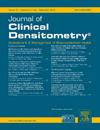Effects of Lumbar Spine Vertebral Fractures on Trabecular Bone Score (TBS): The Manitoba BMD Registry
IF 1.6
4区 医学
Q4 ENDOCRINOLOGY & METABOLISM
引用次数: 0
Abstract
Trabecular bone score (TBS) is a BMD-independent risk factor for fracture. During BMD reporting, it is standard practice to exclude lumbar vertebral levels affected by structural artifact. It is uncertain whether TBS is affected by lumbar spine fractures. The current study examined the effect of lumbar spine compression fractures on TBS measurements. We identified 656 individuals with vertebral fractures (mean age 75.8 ± 7.9 years, 90.9% female) who had lumbar spine DXA, TBS measurements from L1-L4 and vertebral fracture assessment (VFA) for identifying vertebral fractures. There were 272 cases with lumbar spine fractures and 384 controls with only thoracic spine fractures. L1 TBS and BMD were significantly greater in those with than without lumbar fractures (p< 0.001) but did not significantly differ for other vertebral levels or for L1-L4 combined. TBS and BMD measurements were then renormalized to remove level-specific differences (denoted rTBS and rBMD). The mean difference (all fractured minus all non-fractured vertebrae) was +0.040 (+3.3%) for rTBS and +0.088 g/cm2 (+9.5%) for rBMD (both p <0.001). The largest effect was for L1 with mean difference +0.058 (+4.9%) for rTBS and +0.098 g/cm2 (+10.6%) for rBMD (both p <0.001). The mean difference between fractured and non-fractured levels for rTBS was +0.028 (+2.4%) for grade 1, +0.036 (+3.0%) for grade 2 and +0.059 (+5.0%) for grade 3 fractures; for rBMD +0.051 (+5.5%), +0.076 (+8.2%) and +0.151 (+16.4%) g/cm2, respectively. The impact of excluding lumbar vertebral levels with fracture from the L1-L4 TBS measurement overall was small (-0.011 [-1.0%]; p<0.001) and was also small for grade 3 fractures (-0.020 [-1.7%]; p<0.001). In summary, TBS is mildly increased by VFA-confirmed lumbar vertebral fractures, but the percentage effect is much smaller (less than half) than seen for BMD and minimally affects TBS measured from L1-L4. This would support the use of L1-L4 without exclusions in individuals with lumbar vertebral fractures.
腰椎椎体骨折对骨小梁评分 (TBS) 的影响:马尼托巴省 BMD 登记
骨小梁评分(TBS)是与 BMD 无关的骨折风险因素。在 BMD 报告中,标准做法是排除受结构假象影响的腰椎水平。目前还不确定 TBS 是否受腰椎骨折的影响。本研究考察了腰椎压缩性骨折对 TBS 测量的影响。我们确定了 656 名椎体骨折患者(平均年龄为 75.8 ± 7.9 岁,90.9% 为女性),这些患者接受了腰椎 DXA、L1-L4 的 TBS 测量以及用于识别椎体骨折的椎体骨折评估(VFA)。其中有 272 例腰椎骨折,384 例对照组仅有胸椎骨折。腰椎骨折患者的 L1 TBS 和 BMD 均明显高于非腰椎骨折患者(p< 0.001),但其他椎体水平或 L1-L4 组合无明显差异。然后对 TBS 和 BMD 测量值进行再归一化,以消除特定水平的差异(表示为 rTBS 和 rBMD)。rTBS和rBMD的平均差异(所有骨折椎体减去所有未骨折椎体)分别为+0.040(+3.3%)和+0.088 g/cm2(+9.5%)(均为p <0.001)。对 L1 的影响最大,rTBS 的平均差异为 +0.058 (+4.9%) ,rBMD 的平均差异为 +0.098 g/cm2 (+10.6%) (均为 p <0.001)。骨折与非骨折水平之间的平均差异为:rTBS 1级为+0.028(+2.4%),2级为+0.036(+3.0%),3级为+0.059(+5.0%);rBMD分别为+0.051(+5.5%)、+0.076(+8.2%)和+0.151(+16.4%)g/cm2。从 L1-L4 TBS 测量中排除有骨折的腰椎水平的影响很小(-0.011 [-1.0%]; p<0.001),对 3 级骨折的影响也很小(-0.020 [-1.7%]; p<0.001)。总之,经 VFA 证实的腰椎骨折会轻度增加 TBS,但影响的百分比比 BMD 的影响要小得多(不到一半),而且对 L1-L4 测量的 TBS 影响很小。这将支持在腰椎骨折患者中使用 L1-L4 而不排除其他因素。
本文章由计算机程序翻译,如有差异,请以英文原文为准。
求助全文
约1分钟内获得全文
求助全文
来源期刊

Journal of Clinical Densitometry
医学-内分泌学与代谢
CiteScore
4.90
自引率
8.00%
发文量
92
审稿时长
90 days
期刊介绍:
The Journal is committed to serving ISCD''s mission - the education of heterogenous physician specialties and technologists who are involved in the clinical assessment of skeletal health. The focus of JCD is bone mass measurement, including epidemiology of bone mass, how drugs and diseases alter bone mass, new techniques and quality assurance in bone mass imaging technologies, and bone mass health/economics.
Combining high quality research and review articles with sound, practice-oriented advice, JCD meets the diverse diagnostic and management needs of radiologists, endocrinologists, nephrologists, rheumatologists, gynecologists, family physicians, internists, and technologists whose patients require diagnostic clinical densitometry for therapeutic management.
 求助内容:
求助内容: 应助结果提醒方式:
应助结果提醒方式:


